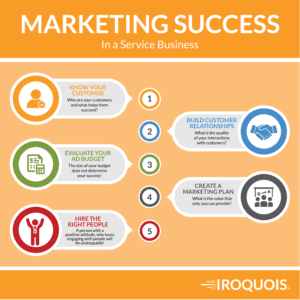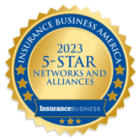In the first episode of our Trusted Advisor Podcast series, we ask what ideas can we steal from another service industry to put us at the head of the pack in ours? Sherry Sanger joined the marketing team at Penske Truck Leasing (a Fortune 500 firm) 20 + years ago. She speaks with Iroquois to share insights on how to market on a small budget, the similarities in B2B and B2C, hiring the right people to deliver on your brand promise, and much, much more.
Edwin K. Morris (3s):
Welcome to the trusted advisor podcast brought to you by Iroquois group. Iroquois is your trusted advisor in all things insurance. I am Edwin K. Morris today in the studio we have Sherry Sanger. She is the senior vice president of marketing at Penske truck leasing. She is responsible for strategic marketing, planning, market research and analysis, communications, public relations, and interactive marketing for a $5 billion company with operations in North America, South America, Europe and Asia. Where are you calling from?
Sherry Sanger (37s):
I am calling from Redding, Pennsylvania.
Edwin K. Morris (39s):
What’s going on in Redding?
Sherry Sanger (40s):
Oh, not much. We had a little snow, but it’s a, it’s a pretty quiet Friday morning right now.
Edwin K. Morris (45s):
What do you do?
Sherry Sanger (49s):
I lead the marketing team at Penske.
Edwin K. Morris (53s):
Wow. That sounds like a big deal.
Sherry Sanger (55s):
It’s a lot of fun. I enjoy it. It’s a, it’s a global business. We have operations in China and the Netherlands, down in Brazil, but we are predominantly a US-based company.
Edwin K. Morris (1m 6s):
Are you a public trading company?
Sherry Sanger (1m 8s):
We are not, we are private.
Edwin K. Morris (1m 10s):
And you’ve been around for how long?
Sherry Sanger (1m 12s):
We’ve been around for 50 years. This year, we are celebrating our 50th anniversary. We’re pretty proud of it. And we’ve had a pretty good track record. A nice, nice growth trajectory over that time.
Edwin K. Morris (1m 22s):
So in 50 years, has the industry shifted?
Sherry Sanger (1m 26s):
Oh, just a little. Yeah. So the, I’d say the, the world of marketing shifted greatly in that period of time, but, but even our business, we started as a company that Roger Penske bought three locations in Redding, Pottsville, and Allentown, Pennsylvania, bought a small company in 1969. Today we have quite a few locations, over 300,000 vehicles that run on the road and have the privilege of serving a lot of companies. So we’re, we’re one of those companies that’s sort of behind the scenes at work, helping other companies get their goods and products to market
Edwin K. Morris (2m 3s):
Your background and specialty and expertise is marketing
Sherry Sanger (2m 6s):
It is. Been at it for 21 years.
Edwin K. Morris (2m 9s):
What’s the advice you would provide for someone that is looking not for the consumer marketing, but business to business. Is it, is it a different animal altogether?
Sherry Sanger (2m 21s):
You know, I, I find the basic tenets are the same. So I deal with both. We have a consumer aspect to our business, but B2B is the larger part of what we do as an organization. So 95% of our revenue is, is B2B. The tenants of marketing are generally the same, but marketing is all about having a conversation with your customers or potential customers. And so that aspect holds true. It’s just a little different on the B2B side.
Edwin K. Morris (2m 48s):
Is it different in an expectation or participation or revenue or how does it show up?
Sherry Sanger (2m 55s):
I, I don’t know that the revenue matters. I don’t know that the size of the company matters in some cases about having a conversation and connecting with your customers. I, I view marketing as a bit of a relationship function. It’s about helping build relationships and connections with your customers. It’s about understanding them, understanding the people that you provide value for the most, a bit of who they are, and then striking up a conversation with them.
Edwin K. Morris (3m 21s):
So you’re in it for the long haul. It’s not a short term thing.
Sherry Sanger (3m 24s):
No, I don’t view marketing as, a lot of times, marketing gets viewed as advertising and I, I view them as two very different things, right?
Edwin K. Morris (3m 32s):
So what’s, what’s, what’s the difference between advertising and marketing? I mean, it sounds like the same thing
Sherry Sanger (3m 37s):
An ad is I’d say something that’s in the marketing toolkit, but marketing is a broader idea than advertising. An ad is a tool that you use to get attention, build awareness for a brand, or it’s a tool that you use to generate leads, you know, get people to contact you, ideally make them aware of your product and want to try it. Maybe predispose them to wanting to work with you as a company, but it’s a, it’s a tool. And so often that’s what gets all the attention, but really great marketing, you know, doesn’t require large ad budgets.
Edwin K. Morris (4m 12s):
Explain that to me. Cause that sounds counterintuitive. Yeah,
Sherry Sanger (4m 16s):
It’s interesting. A lot of, a lot of times we start to view marketing as synonymous with advertising and we view the folks that have the largest ad budgets as maybe the most talented at marketing. But there are many examples of companies that have small budgets and end up doing phenomenal marketing work because they’re able to, they have to be efficient. They have to be very selective about the things that they do and how they place those bets. I’m not saying that, you know, all large brands are, are inefficient, not at all, but I think some small brands are doing some pretty incredible marketing because they have to be choosy about where they place those bets.
Edwin K. Morris (4m 57s):
The measurement of success in marketing is not how much we’re spending on marketing.
Sherry Sanger (5m 2s):
No, not at all.
Edwin K. Morris (5m 5s):
That would be a tough, tough thing. So for a small company, they could, they could do it. Right. So what, what are the three things they need to know about marketing to make them do it well?
Sherry Sanger (5m 16s):
You know, I think marketing is about knowing your customer first and foremost. So it’s about, you know, really getting to know who you’re doing business with today and not just what they buy from you or not just what that transaction has been like, but really knowing them, knowing what, knowing a little bit about their business. If we’re talking about a B2B side, what really drives their business, what makes them successful? What is that like in terms of we know what sizes of companies do you work with, what industries are they in really get to know them and their challenges. And that’s usually how you can figure out how you can add value for them. So I find it always starts with knowing your customer and then coming up with some kind of plan.
Sherry Sanger (5m 57s):
How do you get more customers like the ones you’re working with and more of the ones that you want to work with. So it’s not sort of this thing that just happens to happen to you, but how can you be really selective about it? So you put a plan together and then honestly it’s about sticking with that plan. You know, re-evaluating it, auditing it, looking at, Hey, what’s been working, what’s not been working and doing some fine tuning and you really, you double down on the things that work well, and then you eliminate the things that haven’t been working. So
Edwin K. Morris (6m 27s):
That’s a constant redress, right? I mean, you’re constantly going back. What’s the heavy lift in the plan development? Is it internal or external? Knowing, cause you keep saying, knowing your customer. Well, that means you really got to know yourself to know what your external partners could be in the business to business relationship, right? How much effort does it take to create this initial plan?
Sherry Sanger (6m 49s):
I don’t think it’s hard at all. It’s, you know, it feels daunting sometimes when people think, Oh, I’ve got to put a whole plan together, but it really starts with laying out a bit of, you know, ground yourself in your customer, ground yourself in the value that you provide. Because most companies don’t provide value to everybody. They’re not ubiquitous. Most companies have structured their offerings in a way that they provide particular value to particular kinds of businesses or people. And so you ground your marketing plan in that. Play where you play best,
Edwin K. Morris (7m 23s):
Play where you play best. For the dollar to dollar spend, where’s the biggest bang for the buck in marketing?
Sherry Sanger (7m 31s):
You know, when I think about, I talked earlier about, you know, building the relationship, if you’re, if you’re after building a relationship with customers, sometimes it’s the little things that matter. Sometimes it’s the communications and interactions that you have with them and really unpacking what those look like. What are the basic emails that you send to them? What are the basic ways that you can interact with them that just let them know you’re there, let them know you’re a help, helping hand, that you’re an expert that can offer advice along the way. Those are things that are, are usually really well received by customers. And so many brands don’t do that anymore. So many brands are so focused on, again, sometimes they’re focused on the big ad campaign or some of those things and they lose sight of those small interactions with customers that you can just have in a very simple fashion.
Sherry Sanger (8m 21s):
And that’s not about sending them an email every day, email boxes are so overloaded. You have to be selective about it. You know, if you’re a smaller business and you’re in a local community, building relationships with people can also involve being involved in the community. How do you get involved in impactful ways in your local community, through the chamber of commerce or through, you know, some of the local charities that are really driving success in the community and getting involved in those things helps you, you’re working alongside people then in your local community, and you can really build a brand.
Edwin K. Morris (8m 57s):
Your evidence, you’re, you’re providing evidence of what you value because you’re participating, you’re engaging in the local community because you’re a participant. You expect to be part of the whole, not separate.
Sherry Sanger (9m 9s):
Exactly. So often it feels like businesses start to lose sight of that they’re an important actor in a community and especially in today’s world, they can be a powerful actor in a community and participating, just lets people know that you’re actually a part of the community success, which most people value. So I think that’s an area that there is so much opportunity, there’s so much need in communities for, for businesses to be involved and to help the community progress along whatever lines those are in that specific geography. It can be as simple as also, you know, an open house, having a barbecue, having, you know, some kind of event for your customers as well. So it doesn’t have to be, you know, something extremely elaborate or you can run contests, you know, for customers where they can enroll and they can maybe win something and maybe they win tickets to a ball game with you or to an event of some sort of, and then you could attend that along with the customer.
Sherry Sanger (10m 9s):
Sure.
Edwin K. Morris (10m 10s):
So it sounds like you’re combining work with fun,
Sherry Sanger (10m 14s):
Right? Again, it’s a, it’s about relationships and relationships are best built through, through interactions with people. So the more that the brand can interact and, and you know, generally if you hire great people and that’s another point for a service brand, you’re not putting products on a shelf. You’re offering service and services delivered by people to people. And so one of the most important things that service brands can do in particular is hire great people and just allow them to interact with your customers. And then the brand gets built that way.
Edwin K. Morris (10m 45s):
Sounds really easy. Just hire great people. But what are the, what are the three questions you would ask somebody to rule them in or out versus just reading a CV or resume?
Sherry Sanger (10m 54s):
Oh gosh, well for service brands, it’s again, it’s about behavior. It’s about, you know, people that enjoy interacting with people. You know, you want to hire people that have a great attitude, you know, that are gonna engage with people in an interesting way. And you want people, you know, generally when you’re working in a business, you want them to be pretty unstoppable. But if they have those other behaviors as well
Edwin K. Morris (11m 17s):
Wait a minute, you, you want people that are unstoppable.
Sherry Sanger (11m 21s):
I do, I want them to have a great attitude. I want them to be, like engaging with others. I want them to go after doing that.
Edwin K. Morris (11m 30s):
Wow. There is a Liberty in that kind of personality. There’s, there’s probably a little tension between somebody that’s way out there versus somebody that’s a turtle that’s heightened in their shell. It’s just exciting to hear that. I think that’s incredible.
Sherry Sanger (11m 47s):
Yeah. Well, you know, I look at it as if you can give people the right run lanes, you let them run, right? You just, you provide a little bit of guidance and support and you agree on what to be done and then let them go. And they usually do great things.
Edwin K. Morris (12m 0s):
That’s opposite of micromanagement.
Sherry Sanger (12m 3s):
That is the opposite. Yeah. I believe people generally look, we all need to go to work and we all generally want to do a good job at work. We just have to give people the opportunity to do that
Edwin K. Morris (12m 14s):
Very much for sharing your view from Penske and from the huge state of Pennsylvania.
Sherry Sanger (12m 19s):
You’re very welcome. It’s great to be here.
Edwin K. Morris (12m 21s):
Thank you. Thanks for listening to this edition of the trusted advisor podcast brought to you by Iroquois group. Iroquois, your trusted advisor for all things insurance, and remember get out of the office and sell. This program was recorded Live at the Cohen multimedia studio on the grounds of Chautauqua institution. I’m Edwin K. Morris and I invite you to join me for the next edition of the trusted advisor podcast.



